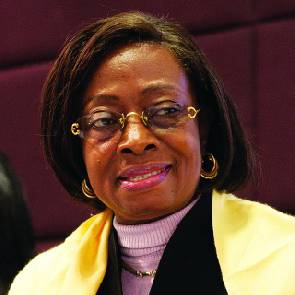
Following the landmark appointment of Justice Sophia Akuffo as the replacement for retiring Chief Justice Georgina Theodora Wood, reams of articles have been written and published on both sides of the debate that Justice Akuffo’s judicial elevation has provoked. But the one article that especially piqued my interest, in a quite amusing way, was captioned “Akufo Triumvirate and Justice for the People” (Modernghana.com 5/12/17). Now, I don’t know whether the author, Nana Yaw Osei, decided on the descriptive of “Triumvirate” simply because he wanted to sensationalize and thus cheaply draw attention to his article and subject of discussion, or he simply did not understand the fundamental or classical sense of this patently pedestrian Elizabethan or Shakespearean term.
A casual dictionary referencing of the term brought up the following definition: “A triumvirate is a ‘group of three influential or notable people holding power.’” In our case, of course, such power refers to the democratic governance culture of Fourth-Republican Ghana. In Ghanaian democratic political culture, there exists a structural system pretty much akin to the concept of a Greco-Roman triumvirate, although the modern Ghanaian version is functionally more institutional in operation than it is individual or personality oriented, as pertained to ancient Greece and, later, the imperial Roman system. Nana Yaw Osei would have his primarily Ghanaian audience believe that the tandem appointments of Ms. Gloria Akuffo and Justice Sophia Akuffo, respectively in time, effectively makes the Akufo-Addo government a familial rule of the Akufos.
This is at once rhetorically grotesque and insufferably absurd, if also because at best what we have here may be loosely termed as a diarchy, a governance system first developed in the Anglophone global community by the British colonial regime in India between 1919 and 1935. This system would eventually evolve into what became widely known as Indirect Rule, in which local administrative establishments or indigenous governance institutions were coopted into the lower rungs or margins of the executive or central government. I cite India as an example primarily because the author of the article in reference would have Ghana copycat the hardly emulative Indian system of selecting the next Chief Justice, which simply authorizes the retiring or outgoing Head of the Judiciary to recommend his/her own replacement for this most cardinal of administrative positions.
I refer to it as one that is hardly emulative or worthy of our emulation because unlike the present Ghanaian system for selecting the next Chief Justice of the Supreme Court, it is clearly open to personal prejudices and abuse of the cronyism type. The Ghanaian system, whereby the Presidency – as distinguished from the President – makes submissions and recommendations to the Council-of-State and, subsequently, have the Candidate vetted by the Parliamentary Appointments Committee (PAC), on the other hand, is far more objective, transparent and morally and politically accountable and civically responsible.
Back to the question of an “Akufo Triumvirate,” as raised by the author of “Akufo Triumvirate and Justice for the People,” the three branches of government in Ghana, namely, the Executive or the Presidency, comprised of the President and his cabinet appointees; the Legislature, composed of Members of Parliament and headed by the Speaker of Parliament or the House; and, of course, the Judiciary, which, of course, is headed by the Chief Justice of the Supreme Court of Ghana. The current Attorney-General and Minister of Justice, Ms. Gloria Akuffo, works directly under the Presidency and cannot therefore be aptly described as constituting a discrete administrative arm of any triumvirate. We must also quickly point out that the Speaker of the House, Prof. Aaron Michael Oquaye, is not a known bona fide member of any “Akufo” or “Akuffo” clan. Chief-Justice-In-Waiting Sophia Akuffo, is related to President Akufo-Addo agnatically, but the office itself is functionally independent of the two aforementioned arms /branches of the government, which are generally known to more closely function together, especially vis-à-vis our Westminster parliamentary system.
In other words, Ghana’s system of government is practically more one of checks-and-balances, however imperfect it may be, than a triumvirate, such as was created by Chairman Jerry John Rawlings under the so-called Provisional National Defense Council (PNDC) junta, in which the swashbuckling National Security Advisor, Capt. Kojo Tsikata (Rd), and his first-cousin, Mr. Tsatsu Tsikata, Chairman Rawlings’ Special Legal Advisor, worked synergistically as a team. The three were also blood relatives.
On the question of the evenhanded administration of justice, the critic only offers more tenuous and hypothetical speculations than any specific cases in point in which the three “Akufos” are known to have conspired, colluded and/or maliciously collaborated to mete blatant injustice to any individual or groups of Ghanaian citizens. And so we cannot take this aspect of the author’s argument seriously, primarily because it clearly and woefully lacks any debatable grist of substance.
*Visit my blog at: kwameokoampaahoofe.wordpress.com Ghanaffairs
The opinions expressed are the author’s and do not necessarily reflect the views or have the endorsement of the Editorial Board of www.africanewsanalysis.com and www.zongonews.com
